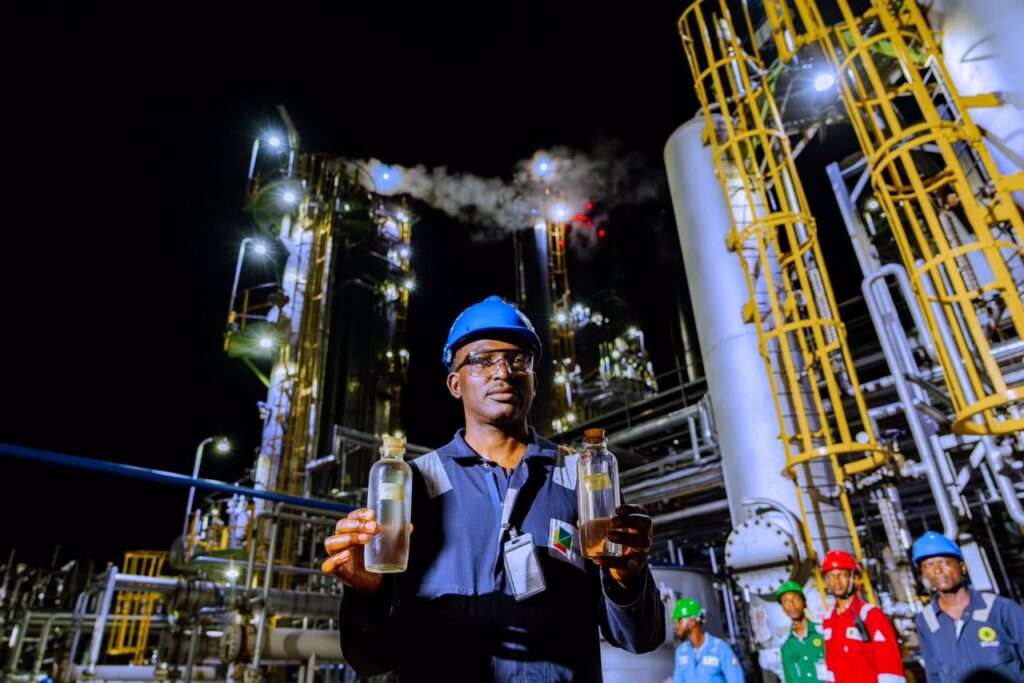Nigeria’s gas production experienced a modest increase in June, reaching 7.581 billion standard cubic feet per day (bscf/d), up from 7.352 billion bscf/d in May, according to the latest performance report by the Nigerian National Petroleum Company Limited (NNPCL).
The growth marks a continued upward trend in the country’s efforts to stabilise and expand its gas sector despite global market volatility and infrastructure challenges.
Gas sales also saw a slight rise, increasing from 4.698 billion million standard cubic feet per day (mmscfd) in May to 4.742 billion mmscfd in June, reflecting ongoing improvements in gas utilisation and export dynamics.
However, the report highlighted “a dip in crude oil and condensate sales, which fell to 21.68 million barrels in June from 24.77 million barrels in May.”
This decline has been attributed to a mix of market constraints and operational adjustments, although the NNPCL said downstream performance remains robust.
Fuel availability at NNPC Retail Limited stations significantly improved, rising to 71 percent in June compared to 62 percent the previous month.
The improvement is a key outcome of coordinated efforts across the petroleum downstream value chain.

The report noted, “Ongoing industry-wide collaborations are increasingly improving synergies to achieve production improvement and cost optimisation,” pointing to the broader strategic reforms taking root in the sector.
One of the most notable operational milestones in June was the successful completion of the Ajaokuta-Kaduna-Kano (AKK) River Niger Crossing, a crucial section of Nigeria’s flagship gas infrastructure project.
The company confirmed the completion has “significantly de-risked the completion of the mainline,” and that additional interventions are being put in place to accelerate project delivery.
In parallel, the company began a technical review of the OB3 River Niger Crossing, intending to replicate the AKK success model for expedited execution.
Other refinery rehabilitation works at Port Harcourt Refining Company (PHRC), Warri Refining and Petrochemical Company (WRPC), and Kaduna Refining and Petrochemical Company (KRPC) were also reported to be progressing steadily.
Record Financial Performance

NNPCL also announced impressive financial results for June 2025, reporting a profit after tax of N905 billion.
The state-owned energy firm generated a total revenue of N4.571 trillion in the period under review, reinforcing its turnaround trajectory since the corporation transitioned into a commercial entity under the Petroleum Industry Act (PIA).
The profit figure represents a continuation of the positive earnings momentum established in earlier months, driven largely by improved oil and gas output and strategic cost controls.
Cumulative statutory payments made to the Federation Account between January and May 2025 reached N6.961 trillion, underscoring NNPCL’s vital role in national revenue mobilisation.
Energy analysts believe the corporation’s sustained profitability signals a broader recovery in Nigeria’s petroleum industry, despite the persistent hurdles of crude theft, underinvestment, and infrastructural bottlenecks.

On the social development front, the NNPC Foundation continued to drive grassroots engagement through its Financial Literacy Programme. In June alone, 67,544 National Youth Service Corps (NYSC) members were trained across various locations in Nigeria.
This brings the cumulative number of trained corps members to 870,383, a milestone that reflects the corporation’s investment in human capital development and financial inclusion.
Looking ahead, NNPCL’s focus remains fixed on completing key infrastructure projects, boosting domestic refining capacity, and expanding gas monetisation schemes.
With ongoing works on the AKK and OB3 pipelines, coupled with efforts to rehabilitate major refineries, the company aims to drastically reduce Nigeria’s dependence on imported petroleum products and unlock new opportunities in the gas export market.
While challenges remain, particularly in the areas of crude theft and regulatory delays, the corporation’s June report sends a clear signal that a path toward operational stability and fiscal resilience is taking shape.
READ ALSO: Ghana Fire Service Records Major Progress Amid Resource Constraints



















